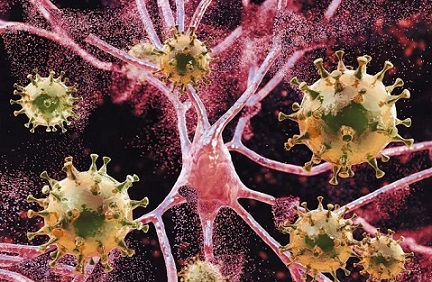Italian researchers warn that common respiratory RSV infections are a threat to the brain
Nikhil Prasad Fact checked by:Thailand Medical News Team Jul 23, 2024 1 year, 4 months, 3 weeks, 5 days, 23 hours, 52 minutes ago
Medical News: The Hidden Threat to the Brain
Researchers from various esteemed institutions in Italy have recently shed light on a concerning aspect of respiratory syncytial virus (RSV) infections: their potential to cause complications in the central nervous system (CNS). This
Medical News report delves into their findings, explaining the risks and implications of these complications in a way that is accessible to everyone.
 Common respiratory RSV infections are a threat to the brain.
What is RSV?
Common respiratory RSV infections are a threat to the brain.
What is RSV?
Respiratory syncytial virus, commonly known as RSV, is a highly contagious virus that primarily affects the respiratory tract. It's especially known for causing severe infections in infants and the elderly. Before the COVID-19 pandemic, RSV was responsible for approximately 33 million cases of acute respiratory infections each year. While most people are familiar with the respiratory symptoms of RSV, this article reveals the lesser-known neurological complications that can arise from the infection.
The Study
the Italian study team conducted a systematic review and meta-analysis to understand the occurrence of encephalitis and encephalopathy associated with RSV infections. The study involved a thorough examination of databases such as PubMed, Embase, and Scopus for relevant observational studies. They analyzed data from 15 studies encompassing 7719 RSV infections and 1631 cases of encephalitis. Additionally, 27 case reports were reviewed, revealing 84 individual cases of encephalitis or encephalopathy occurring during documented RSV infections.
Key Findings
The analysis revealed some startling statistics:
-The pooled prevalence of encephalitis/encephalopathy among RSV cases was found to be 2.20 cases per 100 RSV infections.
-The prevalence of RSV infections among encephalitis/encephalopathy cases was 3.53 per 100 cases when respiratory specimens were analyzed and 0.37 per 100 cases when CNS specimens were analyzed.
-The detection of RSV within the CNS was 17.86% of pooled case reports. This detection was more likely in males and often resulted in long-term sequelae.
Who is at Risk?
RSV affects individuals of all ages, but certain groups are more susceptible to severe complications. Infants under two years old and the elderly, particularly those with pre-existing health conditions like chronic obstructive pulmonary disease or congestive heart disorder, are at higher risk. The study highlighted that even healthy children without noticeable comorbidities could develop severe complications from RSV.
Neurological Complications
One of the most concerning findings was the association between RSV and neurological complications such as encephalitis and encephalopathy. These conditions involve inflammation and dysfunction of the brain, leading to symptoms like altered mental status, seizures, and in severe cases,
coma or death. The exact mechanism by which RSV causes these complications is not entirely understood, but it is believed to involve both direct infection of CNS cells and an exaggerated inflammatory response.
Case Reports
The researchers compiled data from various case reports to illustrate the clinical characteristics of RSV-related encephalopathy/encephalitis. They found that:
-Most cases occurred in males.
The majority of affected individuals were under one year of age.
-Common symptoms included seizures, altered consciousness, and respiratory distress.
-A significant number of cases required intensive care, with some patients needing mechanical ventilation or extracorporeal membrane oxygenation (ECMO).
Diagnostic Challenges
Diagnosing RSV-related encephalitis/encephalopathy can be challenging due to its rarity and the nonspecific nature of its symptoms. However, the study emphasized the importance of considering RSV as a potential cause when patients present with neurological symptoms during the RSV season. Advanced imaging techniques like MRI and EEG were highlighted as useful tools in detecting brain anomalies associated with RSV infections.
The Way Forward
The study's findings underscore the need for increased awareness and further research into the neurological complications of RSV. Healthcare professionals should be vigilant during the RSV season, especially when treating vulnerable populations. Early detection and intervention can significantly improve outcomes for patients with RSV-related encephalitis/encephalopathy.
Conclusion
RSV is not just a respiratory virus; it poses a serious threat to the brain, particularly in young children and the elderly. The study conducted by researchers from institutions including the University of Palermo, University of Parma, and University of Bologna has provided valuable insights into the prevalence and characteristics of CNS complications associated with RSV infections.
The study findings were published in the peer-reviewed journal: Epidemiologia.
https://www.mdpi.com/2673-3986/5/3/31
For the latest news, keep on logging to Thailand
Medical News.
Read Also:
https://www.thailandmedical.news/news/medical-news-respiratory-syncytial-virus-rsv-infects-nerve-cells-directly-and-can-cause-a-variety-of-long-term-neurological-issues
https://www.thailandmedical.news/news/breaking-american-and-argentinian-scientists-find-that-the-human-respiratory-syncytial-virus-rsv-is-rapidly-mutating-to-evade-vaccines
